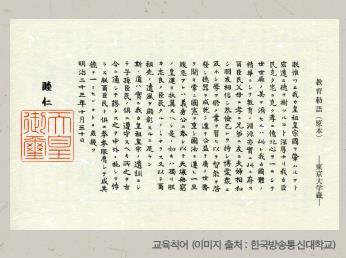
A Revival of Modern Japan's Imperial Rescript on Education
The Abe administration has lately been heavily censured from the opposition party for its involvement in the political scandal surrounding the shady sale of Osaka (大阪) government land to the private school operator Moritomo (森友) Gakuen. And the news report that a kindergarten run by Moritomo Gakuen, where the Prime Minister's wife Akie (昭惠) was to serve as honorary principal, makes its students recite the Imperial Rescript on Education, gave rise to controversies over how Japanese Diet members view the edict that begins with the following line: "Know ye, Our subjects: Our Imperial Ancestors have founded Our Empire on a basis broad and everlasting and have deeply and firmly implanted virtue." In response to a note demanding a ban on the use of an edict that once dictated the country's moral education during its imperialistic past, the Abe cabinet released a statement on March 31st, 2017 announcing that, although it would be "inappropriate" to use the Imperial Rescript on Education as "the sole basis for the nation's education," its use as teaching material "cannot be denied as long as it does not violate the Constitution and the Fundamental Law of Education." In other words, the administration is allowing schools in Japan to teach commandments from an age of modern imperialism that negates all values other than those the commandments impart and goes against the ideas of the nation's present constitution.
The Imperial Rescript on Education is a document Emperor Meiji (明治) issued in 1890, the year following the Meiji Constitution's proclamation, to proclaim his will in terms of education. After losing the war, the Japanese Diet decided to nullify the rescript in 1948 for "being based on imperial sovereignty and a mythic view of polity" and for "undermining basic human rights." And after seventy or so years since then, it is now being resurrected and pulled back into the spotlight along with recent discussions of constitutional revision. As such, this article looks into the background, content, and implications of the Imperial Rescript on Education.
Seo Chong-chin (Director, NAHF Institute of Japanese Studies)